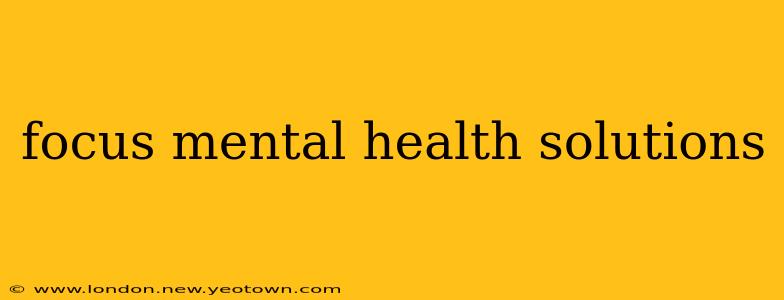Life's relentless demands can leave even the most resilient individuals feeling overwhelmed. The constant barrage of notifications, deadlines, and expectations can blur our focus, impacting not only our productivity but also our overall mental well-being. This isn't a sign of weakness; it's a testament to the challenges of modern life. Fortunately, a wealth of solutions are available to help us regain control and cultivate a sharper, healthier mind. This isn't just about boosting productivity; it's about nurturing a vibrant, balanced life.
What are the most effective focus techniques?
Finding what works best for you is key. There's no one-size-fits-all solution when it comes to enhancing focus. However, many proven techniques can significantly improve concentration and mental clarity. Some individuals find success with mindfulness meditation, using apps like Headspace or Calm to cultivate present moment awareness and reduce mental clutter. Others benefit from the Pomodoro Technique, working in focused bursts followed by short breaks, which can prevent burnout and maintain concentration. Experiment with different techniques—journaling, deep breathing exercises, or even a brisk walk in nature—to discover the approaches that resonate most strongly with you. The goal is to find a sustainable routine that integrates seamlessly into your daily life.
How can I improve my focus and concentration?
Improving focus is a journey, not a destination. It’s about building healthy habits and nurturing a supportive environment. Start by identifying your biggest distractions. Is it social media? Cluttered workspaces? Interruptions from colleagues or family? Once you've pinpointed the culprits, you can begin implementing strategies to mitigate their impact. This might involve turning off notifications, creating designated workspaces free from distractions, or communicating your need for uninterrupted time to others. Remember, setting boundaries is crucial for protecting your focus and mental space. Incorporating regular physical activity, sufficient sleep, and a balanced diet are also essential for optimal brain function and concentration.
What are some natural ways to improve focus and concentration?
Nature offers a wealth of resources to enhance mental clarity. Regular exercise, particularly activities that engage both the mind and body like yoga or tai chi, can significantly improve focus. Spending time outdoors, even just a short walk in a park, has been shown to reduce stress and enhance cognitive function. Certain foods, rich in omega-3 fatty acids and antioxidants, also support brain health and concentration. Think leafy greens, berries, and fatty fish. Hydration is equally important; dehydration can lead to fatigue and decreased concentration. By incorporating these natural methods into your daily routine, you can create a synergistic effect that enhances both your physical and mental well-being.
What are the best apps for improving focus?
Technology can be both a distraction and a tool for improved focus. Numerous apps are designed to enhance concentration and productivity. Forest, for example, gamifies focus by letting you grow a virtual tree that dies if you leave the app. Freedom blocks distracting websites and apps, providing a distraction-free environment. Headspace and Calm offer guided meditations, promoting mindfulness and reducing stress. The best app for you will depend on your individual preferences and needs, but exploring different options can lead to discovering a powerful ally in your focus journey. Remember to choose apps that align with your lifestyle and goals, rather than adding yet another source of distraction.
How can I deal with an inability to focus?
Persistent difficulty focusing can be a symptom of underlying conditions like ADHD or anxiety. If you're struggling to maintain focus despite implementing various techniques, it's crucial to seek professional help. A therapist or doctor can assess your situation, identify any contributing factors, and recommend appropriate interventions. This might involve medication, therapy, or a combination of both. Don't hesitate to reach out for support; acknowledging the challenge is the first step towards finding effective solutions. Remember, seeking professional guidance is a sign of strength, not weakness. It's a proactive approach to prioritizing your mental well-being and regaining control of your focus.
This journey toward enhanced focus is personal and iterative. Experimentation, self-awareness, and the willingness to seek support when needed are key ingredients to cultivating a sharper, healthier mind. By prioritizing your mental well-being, you’re not just improving your ability to focus; you're investing in a more fulfilling and balanced life.

